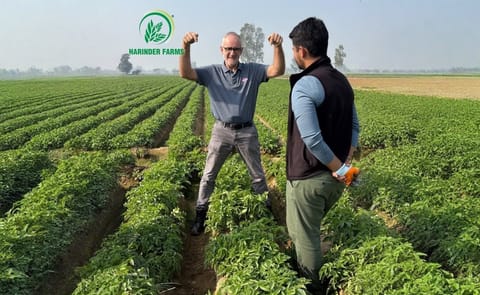Potatoes ready for transport (Gujarat, India)
To boost potato export, India considers establishment of 'pest-free zones'

Aiming to boost potato exports, the Indian government is considering identifying ‘pest-free zones’ for the staple in production clusters of the growing states like Uttar Pradesh and West Bengal.
Although India was the world’s second largest potato producer at 48 million tonnes in 2014-15, its exports were less than one per cent of the output. Potato can be exported to many countries if pest related issues are addressed and standard operating procedures are put in place.
In a meeting held last week, Commerce Minister Nirmala Sitharaman discussed ways to increase potato exports and other related issues with Agriculture Minister Radha Mohan Singh.
“In the meeting, the Commerce Minister emphasised the need to identify pest-free zones for export of potatoes in the production clusters. Both ministries have decided to take further course of action soon on this issue,” a senior government official told PTI.
The Commerce Ministry has suggested that concerned stakeholders such as Indian Council of Agricultural Research (ICAR), Central Potato Research Institute, National Plan Protection Organisation (NPPO) and the state horticulture departments need to interact and prepare an action plan for identification of pest free zones for potato.
That apart, it has also stressed on preparing the Standard Operating Procedure (SOP) for export of potatoes to various countries in order to address the quarantine pest concerns, the official added.
It may be noted that though there is huge demand for Indian potatoes from Russia, the country has not been able to tap the export opportunities fully due to pest related issues.
Identification of pest-free zones in producing areas will help export of quality commodity from India and avoid any rejection of consignments, the official said.
India exported 1.80 lakh tonnes of potatoes in 2014-15 fiscal, which was lower than 3.05 lakh tonnes in the previous year, as per the government data.
Although India was the world’s second largest potato producer at 48 million tonnes in 2014-15, its exports were less than one per cent of the output. Potato can be exported to many countries if pest related issues are addressed and standard operating procedures are put in place.
In a meeting held last week, Commerce Minister Nirmala Sitharaman discussed ways to increase potato exports and other related issues with Agriculture Minister Radha Mohan Singh.
“In the meeting, the Commerce Minister emphasised the need to identify pest-free zones for export of potatoes in the production clusters. Both ministries have decided to take further course of action soon on this issue,” a senior government official told PTI.
The Commerce Ministry has suggested that concerned stakeholders such as Indian Council of Agricultural Research (ICAR), Central Potato Research Institute, National Plan Protection Organisation (NPPO) and the state horticulture departments need to interact and prepare an action plan for identification of pest free zones for potato.
That apart, it has also stressed on preparing the Standard Operating Procedure (SOP) for export of potatoes to various countries in order to address the quarantine pest concerns, the official added.
It may be noted that though there is huge demand for Indian potatoes from Russia, the country has not been able to tap the export opportunities fully due to pest related issues.
Identification of pest-free zones in producing areas will help export of quality commodity from India and avoid any rejection of consignments, the official said.
India exported 1.80 lakh tonnes of potatoes in 2014-15 fiscal, which was lower than 3.05 lakh tonnes in the previous year, as per the government data.
Like to receive news like this by email? Join and Subscribe!
Get the latest potato industry news straight to your WhatsApp. Join the PotatoPro WhatsApp Community!
Uitgelichte Bedrijven
Sponsored Content
Sponsored Content
Sponsored Content
Sponsored Content









